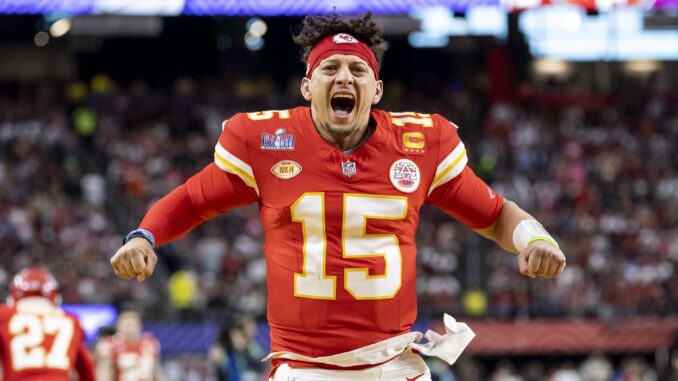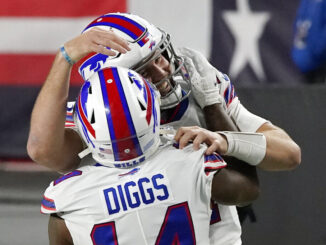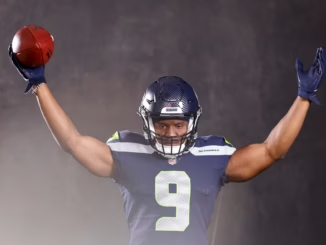
If you haven’t drafted your NFL fantasy team yet, that day is rapidly approaching as most leagues try to draft as close as possible to the NFL season kicking off, which will finally happen next week.
How you draft your team will significantly depend on a few factors: your comfort level with picking players, the scoring system you will be playing in, and what roster spots you need to draft for. Most leagues use a standard roster of one quarterback (QB), two running backs (RB), two wide receivers (WR), one tight end (TE), one flex, which can be an RB or WR, a defense/special teams (D/ST), and a kicker (K). Your league may have different roster spots, so make sure you know how many players you need and at what positions.
Next, you will want to know about the scoring system. Is it .5 PPR, which is what most standard leagues default to? A .5 PPR league awards half a point to any player in your lineup with a catch. Get a lot of catches and get a lot of points. That means a receiver who gets a lot of catches is usually worth more than a guy who only gets a couple of catches a game but scores the occasional touchdown. And in the same way of thinking, a running back who is often involved in the passing game might be worth more in a given week than a guy who gets to run the ball a lot but doesn’t get to run near the end zone and is taken off the field when it’s an obvious passing down. Chances are you will be filling out your lineup with a mix of players like these, but you want to make sure you spend your highest picks on the players that will get you the most points, and that can be tricky when some of the biggest names are not the best fantasy players.
Knowing how your league scores points and who you need to fill your lineup is only half the battle; the other half is knowing who you want and guessing when your opponents may want to take that player. Just because you have your eyes set on a single player, you think the other players in the league won’t want because they play for a team they don’t like – think again. Most competitive people will not avoid players who can win them bragging rights or cash, even if it’s a guy they don’t want to see succeed, because it will mean the team they follow might not do as well.
Regarding fantasy, it’s fun to have your favorite players on your team, but that can be a slippery slope if you avoid some of the best players because they play for a rival team. If you are a Seattle fan and need to pick a wide receiver, and Deebo Samuel and DK Metcalf are both available, who are you taking? You might be surprised that Deebo is the better fantasy player, as he gets a lot of catches and yards and even gets rushing yards occasionally. You want players involved a lot, and Deebo is involved a lot, whereas DK has the occasional big game but is not a weekly big-game player. Deebo played in one fewer game last season and was worth 20 points more than DK over the season. That’s not a ton of points, but if you are unsure which one was worth more, the answer is Deebo. That doesn’t mean you can’t take DK if you think he will have a better year this season; just make sure you aren’t picking players blind just because they are a household name or play for your favorite team.
Taking the best players available is always the best strategy, but when you get toward the bottom of your roster, you may be confused about who to pick. The conventional idea is to keep filling your bench with the best players, but when your starters have bye weeks, you also want to make sure you add quality depth in case one of your starters gets hurt, even if it’s just a couple of weeks. If Geno Smith is your QB, you can assume he probably won’t miss many games since he has a history of staying on the field, but what if he misses a game with a minor injury or an illness? You will want to have a quality backup to start for a week or two, even if it’s just during Seattle’s bye week.
If Kenneth Walker is one of your running backs, you know he usually misses a game or two with an injury. He’s only been in the league for two years, and in both years, he missed two games. So you will want to ensure you have a player on your bench who can fill in for Walker for a week here or there. You could roster Zach Charbonnet, as he is the passing down back in Seattle’s offense and would likely get some extra chances if Walker is out. Still, you will probably want to have rookie Kenny McIntosh instead, as he is more of an early-down back and will probably get early downs and goal-line carries if Walker misses time. Knowing who the best starters are is part of the game; another big part is not just who backs them up but who will likely get the most usage if the starter goes down. With a new offense and a new rookie running back, it’s tough to know what Seattle will do, but you can guess they aren’t going to let their second-string running back take over as the full-time starter if the starter is hurt; most coaches opt for a two-back system in that case and do what most fantasy managers hate to hear – “ride with the hot hand.”
Even though QB is the most critical position on the field in a real game, don’t be too urgent to draft one early on for fantasy; the best QBs and the middle-tier guys aren’t so far apart that it will ruin your chances if you don’t get Patrick Mahomes or Josh Allen. If there are 8, 10, or 12 people in your league, chances are that all of you are getting one very good starter, and a few others will have the best backups. If you miss out on Mahomes and Allen, Lamar Jackson and Joe Burrow are right there also. You can do so much worse than Justin Herbert and he’s going in the middle rounds at the earliest unless you get a crazy person who is a Ducks and Chargers fan, then they might take him number one overall.
Get a couple of receivers and running backs with your first few picks, and don’t worry about what order you get them in as long as you’re getting the best available when you pick. Then, round out your lineup in the middle rounds and get depth in the late rounds. Do reach for players that are supposed to be taken two rounds later than you are drafting, let them fall to you, or if someone else takes them early, use it as an opportunity to get guys you weren’t expecting to be still available. If you have a great player in mind and you just want to make sure you get them, it’s your draft and your call, but don’t make it tough to get good players around them because you got your one player. It’s rare that one player makes a whole team in any sport, and it’s even rarer in fantasy. You need a team of great players; one superstar isn’t going to hide a few picks that don’t work out.
Save your defense and kicker picks for the final rounds unless you go after a top-3 unit. If you are just drafting to say your lineup is complete, you should be waiting on those positions and taking more skill players. It’s amazing how many good skill players are out there, and it’s even more amazing how many of them get hurt every single season. Don’t draft a team that is so loaded on star power that you will have a tough time winning a single game if any of them get hurt because your backups have no business starting. Lots of people will tell you to make sure you roster your best players “handcuffs,” which are players most likely to get the starting role if the starter goes down, but often, those players don’t get you any points; a better strategy is to keep an eye on the health of your best players and if you hear of any short or long term issues, drop a player you don’t need and pick up your back up just in case. Many experienced players will tell you they would rather lose a bench spot to keep their best player’s backup on their roster. Still, in most cases, that backup never sees the starting lineup, and you could have had a usable player that actually got your team points during weeks you really needed a spark.
However you draft your team, make sure you are making your own decisions and not letting someone invade your thoughts or picking the most talented players who may not actually score points on a weekly basis. You need to outscore your opponents every single week, and most importantly during the December and January months when you clinch playoff spots and win playoff games, so make sure your team is built to compete when it gets cold, not just during the warm weather months. It’s a lot of fun to get alerts that your team is scoring a ton of points in September, but when you are begging your backup TE to get a touchdown to save your season in December, you might wish you had drafted a cold weather running back instead of that kid who only plays well indoors or in the fall.
Good luck, and have fun with it! It’s an enjoyable way to feel strangely connected to players you have never heard of before, and you will find yourself overly invested in a game you never would have watched before because one of your players is in a game between New England and Jacksonville in London at 6:30 AM on a Sunday. Spoilers – that game takes place on October 20th. Mark your calendar.




